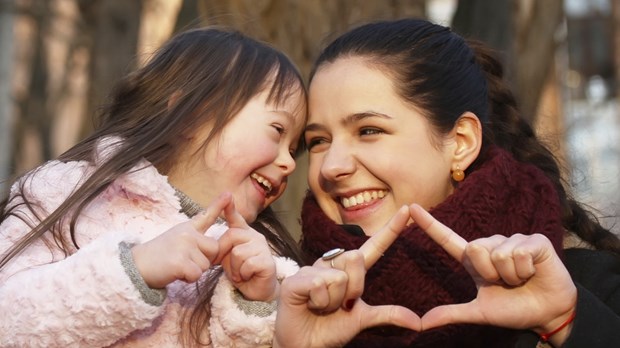The Child I Didn't Expect (But Love Just the Same)

"Mom!" my daughter Polly yells out in my bedroom, asleep. Her body thrashes to and fro on our queen-sized bed. Her legs kick the covers off. Sweat glistens on her forehead.
Her father and two older sisters are at a movie. Her younger sister, all tuckered out from the day’s activities, snores across the hall in her bedroom. I tucked Polly in next to me an hour ago, thinking my husband, Sergei, would move her when he got home, and that the sounds of her breath—methodical, musical—may inspire me as I grab a few minutes to write. The glow of the computer screen is the only light in the room.
"Honey, what's wrong? Tell mom what's wrong," I whisper.
Polly doesn't respond but continues to fuss and squirm on the bed.
"Shh, there, there," I attempt to settle her back into her eluded dream cycle. This isn't new to me, a seasoned mother of four. Countless nights in the last 13 years have been spent brushing wet hair off a forehead, humming a melody, and lulling a child back to sleep. But tonight my coaxing doesn't work.
"What's wrong, Polly? Does something hurt?" My daughter nods her head, and I move in closer. Her breath is warm on my cheek.
Into the Darkness
When I’m near Polly like this, I can’t help but think back to her birth and the immediate suspicion of Down syndrome. A blood test confirmed the diagnosis days later, thus catapulting me into a cavernous grief over the loss of the child I expected. My life had been eclipsed. Dark worries and fear governed me for months. Will she ever go to a typical school? Will she be invited to parties? Will her health be okay? What will her adulthood look like?
Sometimes I look back on that time with shame. Having a child is a good thing. We know from the Psalms that “children are a gift from the Lord” (Psalm 127:3). And my theology is rooted in the providence of God. Down syndrome did not surprise him—but it surprised me and seemed to blow the candle out of my life. I assumed children with special needs would be born to other parents, not us. I stalled out in the dark, and all I wanted was to get out of the darkness as quickly as possible.
Adjusting My Eyes
Like most children, I was afraid of the dark as a young girl. “Keep the hall light on!” I’d call out to my mom after she tucked me in at night. It is simple, really. Darkness is scary because we cannot see. And for those of us who are used to seeing, we have no bearings in the dark. That’s why kids want their parents to stay with them at bedtime, and a blanket often becomes special to a small child because it is something to hold on to.
During Polly’s first year, I attempted to hold on to many different things in the dark: the latest Down syndrome book for parents, and other families’ experiences, both good and bad. I combed through the Internet at night after putting my children to bed. I found medical check lists, growth charts, and the number to call for early intervention therapy—all in an effort to help Polly, yes, but also to silence my fears and get me out of the dark. Surely books and therapy and knowledge would alleviate the darkness in my life. But none of that worked. The darkness stayed put.
Of course parents will learn about a child’s new diagnosis. Knowledge is power. Nothing is wrong with finding out what we are dealing with and looking for resources and support. But if our focus is on the diagnosis alone, at least in my experience, it may prolong our inability to see what is right in front of us—that is, a precious child.
“Be patient. Give yourself time. Let the baby change you,” wise friends said. “One day you will love your little girl fiercely. You will wonder how you ever felt differently. God has given you a gift. Your child is light.” I was encouraged to focus on Polly. Feed her. Bathe her. Love her. See her. Really see her.
So I tried. I asked God to help me. Sit in what you perceive as darkness. Get used to it a little bit. See what I have for you here. I clicked off Google, closed the parenting books, and became still in the dark in an effort to adjust my eyesight. And there was Polly, flesh and bones with almond-shaped eyes and a sweet spirit, a person who possessed both darkness and light like the rest of humankind, made in God’s image but born into a broken world. She had calmly been waiting for me to see her. This was the knowledge my heart required for change. Let the baby change you.
Finding the Light
Why are we afraid of the dark? Why are we frightened of the unknown? Once I was able to sit in the darkness without trying to escape, I learned a valuable lesson. If not for darkness, how can I appreciate the light? I thought I was alone in the darkness, but I wasn’t. God was there. Polly was there. And even more, once I saw Polly as a baby, my baby, I realized I wasn’t in darkness at all; I was just some place new, with her. The light I had been searching for in all the wrong places had always been there. I just had to be willing to see it.
Sometimes my arms ache to hold Polly the baby. I want to go to the hospital and hold myself as a frightened mother. “It’s okay. I promise you are going to love her,” I long to whisper to the lady hiding in the dark. “Hold your baby close. Don’t worry.”
I missed many tender moments with my child because of my grief. But I cannot discount the beginning of our story together because I’ve learned that darkness exists, in part, to value the light. “You light a lamp for me. The Lord, my God, lights up my darkness” (Psalm 18:28).
“Show me where it hurts." I say. Polly gestures toward her head.
"Your head? Your head hurts?"
She nods. I pull my daughter up onto my chest in the quiet of the night and marvel that I get to hold her here, now. "Honey, let me see."
I pull Polly's face toward mine and examine her. No fever. No signs of sickness. The worry of the moment releases into the air. But I keep her close to my heart. She settles and sinks into me. My body is quicksand. I engulf her. I don't take for granted that she is here in my arms. It is a privilege to feel her weight on me. She sighs and falls back to sleep. I hold her well into the dark night, her light seeping into my pores.
“The light shines in the darkness, and the darkness can never extinguish it” (John 1:5).
Gillian Marchenko is the author of Sun Shine Down and is currently writing a memoir about depression. She lives in Chicago with her husband and four girls.
Copyright © 2014 by Gillian Marchenko and Christianity Today
Read more articles that highlight writing by Christian women at ChristianityToday.com/Women
 Read These Next
Read These Next

 Exercising BraveryIt’s about more than just numbers on a scale
Exercising BraveryIt’s about more than just numbers on a scale Mr. Know-It-All"It's recently come to my attention that my 11-year-old has a reputation as a know-it-all, and he's losing friends and annoying grow-ups, mainly his teachers. We've payer with him and recommended he hold his tongue when he hears someone say something he's sure is wrong (he does have a very high IQ), then come home and write about it in a journal or put it in a storyboard form. Do you have any other suggestions?"
Mr. Know-It-All"It's recently come to my attention that my 11-year-old has a reputation as a know-it-all, and he's losing friends and annoying grow-ups, mainly his teachers. We've payer with him and recommended he hold his tongue when he hears someone say something he's sure is wrong (he does have a very high IQ), then come home and write about it in a journal or put it in a storyboard form. Do you have any other suggestions?"
 When Work Steals Your Life AwaySteps for repairing the damage
When Work Steals Your Life AwaySteps for repairing the damage








 Homepage
Homepage